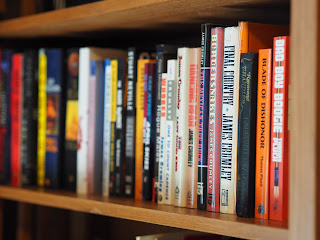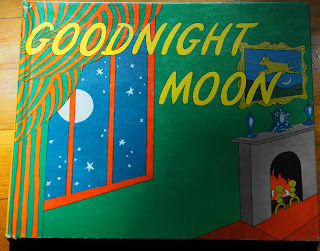Q: Have there been recent novels which had you laughing, crying, clinging to the edge of your seat?
A: That is a tall order, there are very few books I’ve read with that wide a swath of emotions. And seeing as Criminal Minds has the word Criminal in the title, it seems like the book's being crime fiction is implied. Also “recent” so the masters are out. Tall but not impossible.
First up is Charlie Huston’s CATCHPENNY. It is a quintessential LA novel. A young man follows his rock star dreams to LA. He has the looks and voice to make it, but the town being what it is chews him up, takes his love and leaves him broken and that is just the back story. When we meet Sidney Catchpenny he is a jaded sneak thief working for very dangerous people. It’s a crime novel.
There is a missing 16 year-old girl who is needed to save human kind. It’s a thriller.
And in his world magic is real. Sid can travel through mirrors, but pays highly every time he uses magic. It’s a fantasy novel or maybe urban-fantasy.
It’s actually all of those things and more, and this points to the problem with rigid definitions in genre fiction. At its core it is about over coming the bleak world view that traumatic loss creates inside us.
“The whole internet is like a giant mirror. A swampy reflecting pool for the world. Viscous and unclean, mottled, distorting.” — Charlie Huston, CATCHPENNY.
It is about the power of hope to bring us together. For readers of Huston this may sound out of character, but trust me it’s not. It is a tough world that he never shies away from. His earlier works showed brilliantly how and why people could be broken, in CATCHPENNY he suggests a way we can heal.
“I let myself imagine that it mattered, my voice. Vanity again. But also this. Imagine this. I let myself dream that my voice had a place in this that nothing else could have filled.” — Charlie Huston, CATCHPENNY.
For the last year I have been dipping in and out of an ever darkening depression. Reading CATCHPENNY something shifted. I saw a way to climb out. It is a brilliantly written thrill ride. The final chapters kept me reading all night. Charlie Huston has never been better.
"I absolutely loved it. Catchpenny is a brilliant book, full of heart and the language is pitch-perfect. If Elmore Leonard had ever written a fantasy novel, this would be it.” —Stephen King
Tana French’s, THE HUNTER is the follow up to THE SEARCHER. Cal Hooper, is back as the blown-in retired Chicago Detective living in a small village in the West of Ireland. French captures the claustrophobic feeling and real danger of living in a community where everybody knows your business and rumors spread fast and have real consequences. Trey Reddy, the half-feral teenager Cal is training in life and carpentry has her life torn up when her criminal father comes home spreading dreams of a gold rush coming to town. It all goes to hell and town folk look for whom to give to the Garda.
In Cal and his woman friend Lena, Tana French gives us a portrait of flawed but truly moral people whose behavior we can all aspire to. THE HUNTER is scary and funny and poignant. Tana French is a writer who just keeps getting better.
Gary Phillips’, ASH DARK AS NIGHT follows Harry Ingram in Los Angeles 1965 as he documents and tries to make sense of the Watts uprising or riot depending on your neighborhood and political bent. On one level it is a pitch perfect detective novel. A photo journalist hired to find a man who disappeared in mayhem is beaten down by dirty cops and cruel gagsters. Zooming back you see it is also a social novel, looking at what was happing in 1965 and how it affected communities of color. Watts is not seen as a monolith. Phillips shows a wide palette of people and opinions. True believing Communists, a bank robbing activist, conservative business owners, and free thinking artists. Phillips’ love for them all creates a world I want to hang out in. It is also a scary world where LAPD can grab and beat you with no fear of repercussions. It is factually right on, and that makes it even more frightening.
“For thirty years Phillips has been a must-read writer, and One-Shot Harry is probably his best ever—tense and suspenseful, of course, but also deep, resonant and intelligent. It's a story that needed to be told, and therefore a book that needs to be read.” —Lee Child
ASH AS DARK AS NIGHT is the second in the A Harry Ingram Mystery series and should be mandatory reading for lovers of crime fiction and everyone else. Gary Phillips paints a more truthful picture of LA in the 60’s than any history book I’ve read.
Phillips does all this with his trademark humor, heart, and unrelenting action. You will find yourself laughing, crying, and clinging to the edge of your seat, I know I did.
“In the tradition of Dashiell Hammett . . . Makes us feel that the war he’s waging is for our own salvation.” —Walter Mosley
Here are a few others that I’ve read in the last year and continue to reverberate in my head.
THE HEAVEN & EARTH GROCERY STORE, by James McBride.
PEDRO PARĀMO, by Juan Rulfo.
DEATH IN THE ANDES, by Mario Vargas Llosa.
What books tick all your boxes? How do you feel about genre and sub-genre definitions, helpful, hurtful, or ya don’t even think about them?
*******
What I’m reading now, THE FITH SEASON, by N.K. Jemisin.
On deck to read next, THE FLAMETHROWERS, by Rachel Kushner.



















